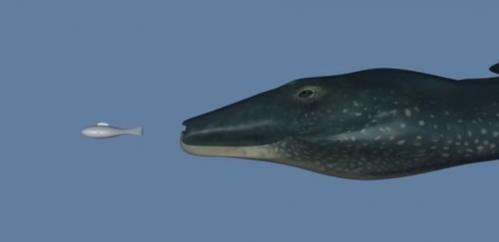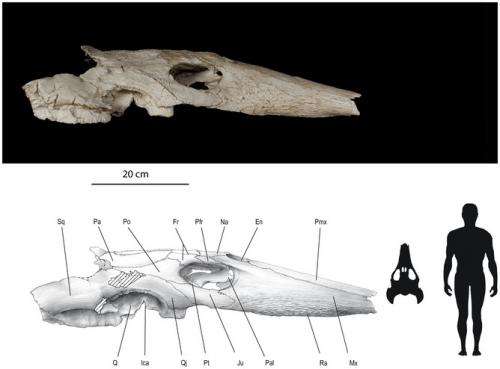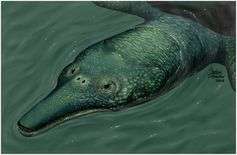Mesozoic turtle reconstructed

During the Mesozoic Era, between 252m and 66m years ago, the seas were ruled by a vast and intriguing array of reptiles. The most common ones were crocodiles (adapted to swimming in oceans), plesiosaurs (Loch Ness monster wannabes) and ichthyosaurs (over-sized predatory tuna).
But turtles also existed. They adopted marine lifestyle later, when a group called Chelonioidea got really big and decided to take to the seas. Now, in a new study published in PLOS ONE, researchers have found a new turtle from that era. It has been named Ocepechelon bouyai and is known from a rather exquisitely preserved skull from the Late Cretaceous period found in Morocco.
The skull is unique and reveals some unusual things. First, this turtle is much bigger compared to its modern relatives. Second, O. bouyai has its nose-slits and eye sockets placed on the top of its head, just like modern crocodiles have theirs, which they use to hunt close to the surface.
The most striking thing about O. bouyai is that it had a bony pipette-like snout. The snout does not have any teeth, which means the only way O. bouyai fed itself was by using the snout like a straw. Suction feeding is a quite widely used form of feeding in fish and amphibians. But among animals with four limbs, it is almost unique.

Given the size of its mouth, we can infer the maximum prey size. So O. bouyai most likely fed on small fish, squid or jellyfish. It would do this, in a similar manner to beaked whales, by creating a depression within its skull (particularly a region called the buccopharyngeal cavity), which would create suction force and drag water and prey into its tubular mouth.
We find this structure in animals as different as seahorses and beaked whales, showing widespread convergent evolution to take advantage of a unique and specialised way of feeding in the seas. In these animals the part that creates suction is made of soft tissue, however, which has not been preserved. O. bouyai is truly unique though because its buccal tunnel is formed from the skull bones.

More information: "A Giant Chelonioid Turtle from the Late Cretaceous of Morocco with a Suction Feeding Apparatus Unique among Tetrapods," Nathalie Bardet mail, Nour-Eddine Jalil, France de Lapparent de Broin, Damien Germain, Olivier Lambert, Mbarek Amaghzaz. Published: Jul 11, 2013. DOI: 10.1371/journal.pone.0063586
Journal information: PLoS ONE
Source: The Conversation
This story is published courtesy of The Conversation (under Creative Commons-Attribution/No derivatives).
![]()


















